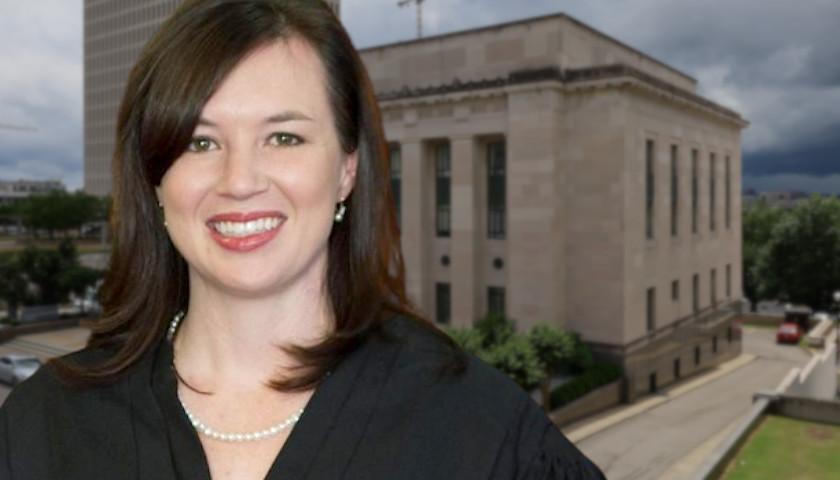As Tennessee Supreme Court Justice Roger A. Page plans to retire at the end of August in 2024, six judges from around the state are vying to replace him. The Tennessee Star plans to profile each of the applicants before they are interviewed for the position in January.
Judge Mary L. Wagner, a circuit court judge for the Thirtieth Judicial District in Memphis, applied to fill Page’s seat on the state’s highest court.
She was first appointed to the circuit court in 2016 by then-Gov. Bill Haslam (R).
“With her extensive background in Shelby County, Mary Wagner is well prepared for a seat on the circuit court in the 30th Judicial District,” Haslam said at the time of her appointment. “We are fortunate to have someone with her experience, and we are pleased to announce this appointment.”
She was re-elected to the position two years later, winning 55 percent of the vote against challenger Michael G. Floyd, according to Ballotpedia.
Wagner (pictured above) was re-elected again in 2022, this time with 63 percent of the vote, against Paul Robinson Jr.
The judge graduated magna cum laude with a law degree from the Cecil C. Humphreys School of Law at the University of Memphis in 2009 after receiving a bachelor’s degree in political science from the University of Colorado in 2006.
After law school, she served as a law clerk from 2009 to 2010 for Judge Steven Stafford of the Tennessee Court of Appeals before making the switch to private practice. She worked at the Memphis law firm Rice, Amundsen & Caperton PLLC doing general litigation. She worked at the firm until she was first appointed to the circuit court.
During some of her time working at the firm, she taught legal writing and oral advocacy at her alma mater as an adjunct professor.
Wagner has a connection with the Tennessee Supreme Court already. She was appointed by the state Supreme Court to be a special judge for the Tennessee Worker’s Compensation Appeals Panel.
In a notable case from earlier this year, Wagner dismissed a lawsuit against the City of Memphis filed by a woman named Alicia Franklin.
Franklin was allegedly raped in September of 2021 by Cleotha Abston, the man who is now charged with the brutal murder of Eliza Fletcher.
“They had more than enough evidence that night when they interviewed me to get him off the streets, but they didn’t,” said Franklin in a September 2022 interview with Good Morning America.
Franklin said she met Abston on a dating application, and after the pair went on a date, he raped her at gunpoint.
She said she drove herself to the hospital, where a sexual assault kit was administered, but that the Memphis Police Department (MPD) did not properly investigate.
“Every time I said something he threatened to kill me,” Franklin said. “He forced me in the car [and] he raped me.”
She said that despite the sexual assault kit, giving authorities Abston’s phone number, walking police officers through the crime scene, and describing his car immediately after the alleged rape, MPD allegedly said it did not have enough evidence to charge Abston.
“They said they didn’t have enough evidence,” said Franklin in the interview. “[They said] this is not enough evidence to charge him for rape.”
Abston was not charged with Franklin’s alleged rape until his DNA was matched to her sexual assault kit more than a year after the incident, in early September of 2022.
In the meantime, Abston allegedly murdered Fletcher.
– – –
Pete D’Abrosca is a reporter at The Tennessee Star and The Star News Network. Follow Pete on Twitter/X.
Background Photo “Tennessee Supreme Court” by Antony-22. CC BY-SA 4.0.






“cited”
It sounds like she should be prohibited of being any kind of judge.
Any reasonable individual could have allowed all evidence to have been heard in the case sighted. If the public duty doctrine applied a full trial would have made that clear. Not allowing the public to bring a reasonable lawsuit against public officials who violate the public trust undermines that trust. A woman is dead and another one was raped by the murderer. I don’t think this is a case of hindsight. If you allow criminals to commit crimes without consequence the will continue to do so.